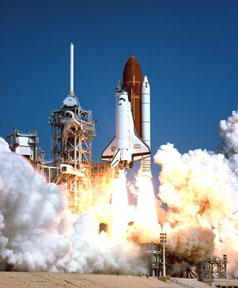Space Shuttle Endeavour during one if its many launches. The next three NASA missions are postponed.
Click on image for full size
Courtesy of NASA
NASA Can't Keep Tight Schedule
News story originally written on August 25, 1999
The next three NASA missions will be rescheduled due to inspections. Faulty wiring aboard Columbia has forced the program to investigate the other three spacecraft. The trouble began when Columbia's July 23, 1999, flight was put in danger when a short circuit caused two engine computers to fail. If the backups had also failed, the crew would have been forced to make an emergency landing.
Scientists later found that a small opening in wire insulation triggered the short circuit. When a second faulty wire was discovered, NASA had no choice but to delay future launches. Scientists found similar problems aboard Endeavor, Discovery and Atlantis.
"It is a direct result of the fact that we are doing the wiring inspections and repairs," said James Hartsfield, a spokesman for NASA's Johnson Space Center in Houston. "And from what we've found, the inspections have proven to be a very prudent thing for us to have undertaken on the orbiters."
The three shuttle missions affected by the inspections include a radar-mapping mission that was scheduled for September 16, aboard Endeavour. Discovery planned to send a crew to repair the Hubble Space Telescope on October 14, and a space station construction mission was planned for December. All three missions will be rescheduled soon.
You might also be interested in:
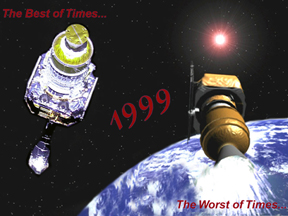
It was another exciting and frustrating year for the space science program. It seemed that every step forward led to one backwards. Either way, NASA led the way to a great century of discovery. Unfortunately,
...more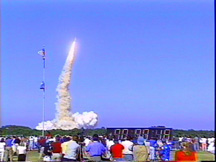
The Space Shuttle Discovery lifted off from Kennedy Space Center at 2:19 p.m. EST, October 29th. The sky was clear and the weather was great as Discovery took 8 1/2 minutes to reach orbit for the Unitied
...more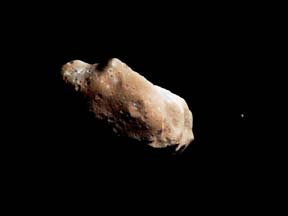
A moon was discovered orbiting the asteroid, Eugenia. This is only the second time in history that a satellite has been seen circling an asteroid. A special mirror allowed scientists to find the moon
...more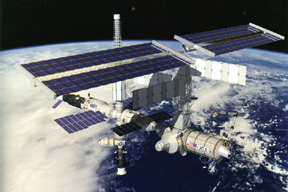
Will Russia ever put the service module for the International Space Station in space? NASA officials are demanding an answer from the Russian government. The necessary service module is currently waiting
...more
During a period of about two days in early May, 1998, the ACE spacecraft was immersed in plasma associated with a coronal mass ejection (CME). The SWICS instrument on ACE, which determines unambiguously
...more
J.S. Maini of the Canadian Forest Service has referred to forests as the "heart and lungs of the world." Forests reduce soil erosion, maintain water quality, contribute to atmospheric humidity and cloud
...more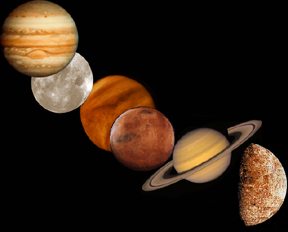
In late April through mid-May 2002, all five naked-eye planets are visible simultaneously in the night sky! This is includes Mercury which is generally very hard to see because of its proximity to the
...more


